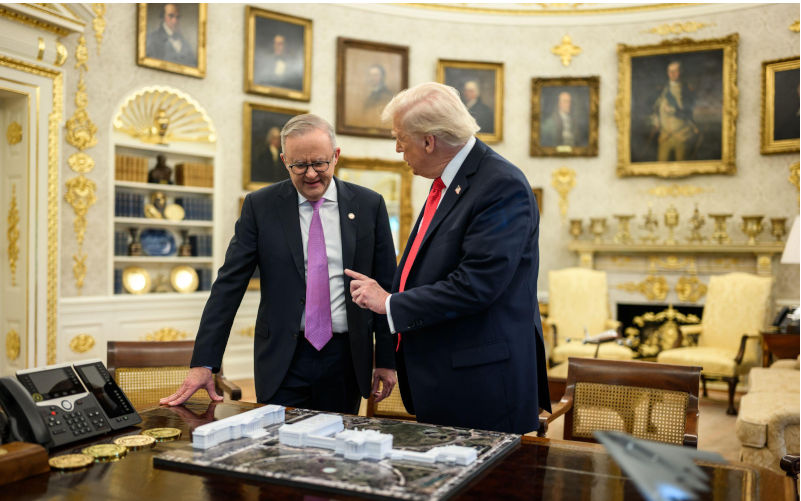Trump turns the tables on Taiwan
November 6, 2025
When the razzle dazzle of the prime minister’s first face-to-face meeting with the mercurial US president is forgotten and the huge sigh of relief that nothing went wrong subsides, questions will be asked about what all the puffery achieved.
Trump gave a vacuous sounding endorsement of AUKUS, but did nothing for Australia on tariffs, despite the US running a continuous trade surplus with Australia and the infinitesimal amount of revenue the Australian tariff raises.
With much fanfare, the critical minerals deal was the headline deliverable. But even if taxpayer spending started yesterday, it will be years before it has any trade effect and, in any event, volumes will be small compared with world trade.
But Trump provided plenty of entertainment joshing Australia’s ambassador to China. In fact, the belittling of Australia’s former prime minister will probably be the outcome most remembered from this meeting.
That is a pity because Trump made a significant comment among the frivolity. When asked if China was about to invade Taiwan, he said he did not envisage a military conflict over Taiwan. In his judgment, although Xi would love to have Taiwan under the PRC’s flag, Trump felt there was no appetite to do it militarily.
This is both a remarkable and significant statement. Remarkable because it has been an article of faith among Washington’s foreign policy hawks that a military invasion was not only inevitable but was possibly imminent. This dangerous assumption has for years been fed into Australia’s strategic policy thinking via US-aligned think-tanks.
Hardly a week passed when the Morrison Government didn’t warn of the dire threat of an imminent invasion of Taiwan: Dutton and the secretary of Homeland Security dramatically intoned about the “drums of war”. All of this served to create an atmosphere in which relations between Australian and China were allowed to become hostile, with the economic costs disregarded in the bigger cause of national security.
Trump’s statement was also significant because it suggests a resetting of the US-China relationship. This could be the beginning of a shift from a posture based on the inevitability of conflict to one of superpower accommodation.
But this is not, as Paul Keating was reported in these pages to have said, because Trump had “licked the lolly” of peace and likes it. Trump came into office already biased in favour of peace. Not that he is a latter-day limp-wristed peacenik. Rather, he understands how awesome US power is and is prepared, as we have seen for example in the bombing of Iran’s nuclear facilities, to use it.
His is a world of great power relations. The MAGA movement demands that he must look first to US interests. What matters are the great powers and his belief that he can work with their rulers. It is to them he looks to cut a deal that advantages the US. Gone is the Biden latticework of alliances. It is breathtaking, for example, that he has so casually undone decades of US diplomacy with India which was intended to use India to help balance China.
For Taiwan, this could mean that it is a small piece in a much bigger game for Trump. He will not send troops to defend Taiwanese democracy or the “rules=based international order”. Taiwan, which for so long has been the potential trigger for a conflict between the US and China, which Australia would find it almost impossible not to join with the US, and which many in the Australian security establishment would want us to join, is suddenly no longer important.
Trump has caged the China threat. His statement that he did not believe Beijing would attempt to invade Taiwan is the most he has said on how US-China relations might be managed, apart from his on-and-off tariffs. Australian policymakers would do well to take careful note of this.
In the days before the prime minister met Trump, a serious incident occurred over the South China Sea when a Chinese air force fighter fired flares which, according to the Australian defence minister, were dangerously close to an Australia surveillance plane.
The Australian plane was conducting Freedom of Navigation Operations intended to challenge China’s assertion of sovereignty over specs of rock and small atolls. It is curious that such an operation was occurring just before the prime minister’s visit to Washington. Was this part of a package to demonstrate to Washington that Australia is a reliable ally or was it simply coincidental? As there is no transparency, we do not know the frequency or reason such operations are conducted.
What is telling is that such a high-profile incident did not make it onto the public record when the prime minister met the president. Surely, at the very least, it would have been expected by the Australian side that the US president would have called out China’s bad behaviour and condemned its actions in the strongest possible terms.
FONOPs are deliberate provocations of China which risk the lives of Australia’s service personnel. At the very least, in such close-quarters skirmishing, accidents can and perhaps one day will happen. We do not know if Cabinet has endorsed such risk taking.
It is starting to seem, however, that such adventurism has little place in Trump’s strategic world of great power relations. In such a world, Taiwan and Australian service personnel may be dispensable to the much more important objective of serving US interests as Trump and MAGA perceive them.
Republished from Australian Financial Review, 24 October 2025
The views expressed in this article may or may not reflect those of Pearls and Irritations.


